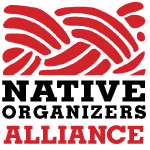
Dear friend,
Native Organizers Alliance (NOA), IllumiNative, and Research for Indigenous Social Action and Equity (RISE) have launched the second annual Indigenous Futures Survey (IFS), a Native-led research project designed to highlight the authentic experiences, systemic challenges, and priority issues of Native peoples today.
The inaugural Indigenous Futures Survey was the largest and most comprehensive study ever conducted in Indian Country.
Native and Indigenous peoples all across the United States are invited again to participate in the survey and voice their perspectives and opinions on critical issues our communities face.
Data gathered from the IFS is being used to make policy changes by elected and tribal leaders. The 2021 reports and research data were shared broadly across Indian Country and were used to inform Congress on the impacts of COVID on Indigenous communities and on a broad spectrum of issues including civic engagement, identity, and culture.
The 2022 IFS will continue to be a tool for social change.
“Native and Indigenous peoples deserve to be seen and heard,” said Crystal Echo Hawk (Pawnee), founder and executive director of IllumiNative. “For so long, we have been forgotten or worse, deliberately excluded from research and data collection. But we have taken back the power to control our own visibility and future through the Indigenous Futures Survey.”
“The 2020 survey was the first opportunity for Native peoples and communities to share the challenges they face with a national audience,” said Judith LeBlanc (Caddo), director of Native Organizers Alliance. “The results gave us a platform to advocate for change at all levels of government. We were able to take a step towards reclaiming our collective voice, showing that Native people are politically engaged and actively challenging the narrative. We proved that our voices matter and that we will organize for meaningful change.”
"For too long data, or lack thereof, has been used to silence and render Indigenous Peoples and experiences invisible. The majority of scientific research omits Indigenous Peoples, including research on bias, prejudice, and discrimination. In the rare cases when Indigenous Peoples are included, our data is most often owned by and interpreted through the lens of non-Native researchers. Ultimately, this keeps people from understanding who we are and seeing us as fully human,” said Dr. Stephanie Fryberg (Tulalip), director of Research for Indigenous Social Action and Equity (RISE) Center.
Amber Torres, Chairman of the Walker River Paiute Tribe said, “This also showed our strengths and weaknesses, and where we can continue to build for the next seven generations. The results in 2022 are very important for the fact that we need to see if we have made a dent in any of the issues that were brought up and where we need to continue to advocate for. Native voices have to be at the table.”
Our non-Native relatives, please help spread the word about the survey by sharing on social media and lift up the importance of Native-led data collection.
To learn more, please visit : https://indigenousfutures.org.
Thank you. Hawwih.
Judith LeBlanc
Director
Aucun commentaire:
Enregistrer un commentaire